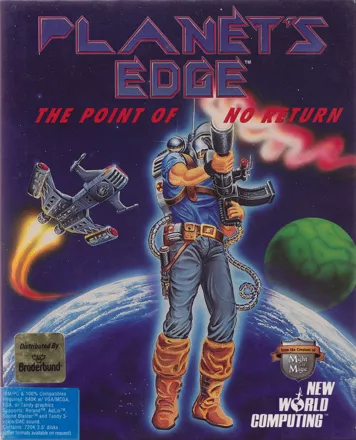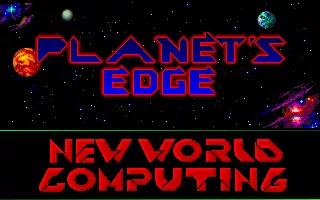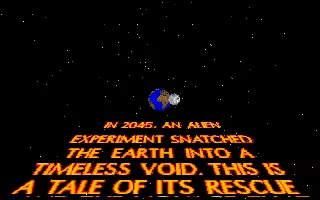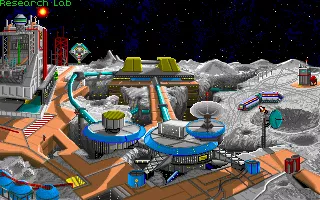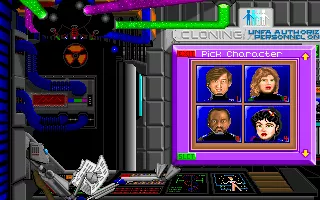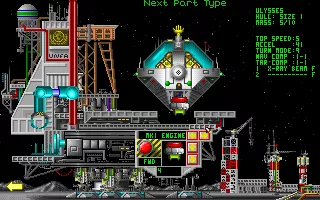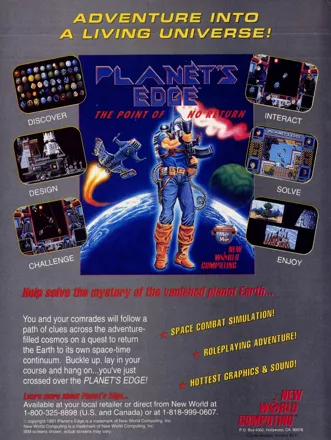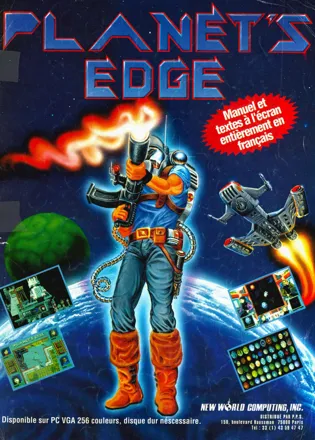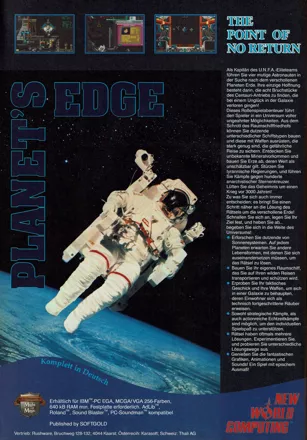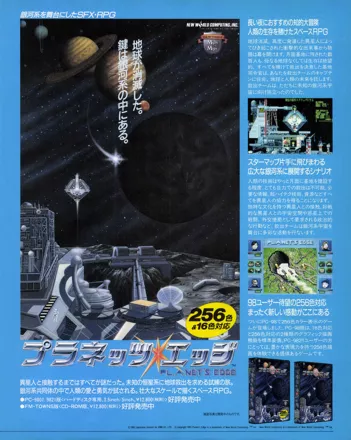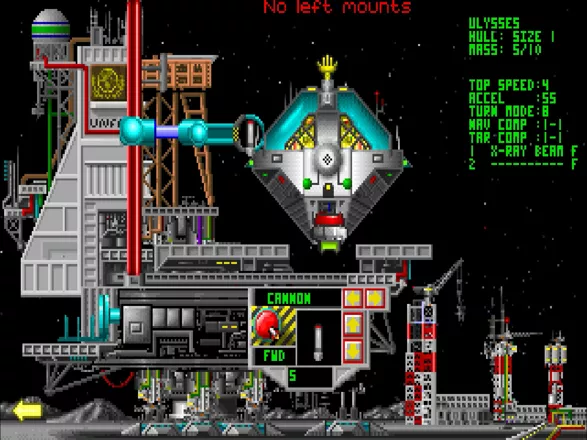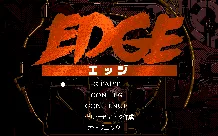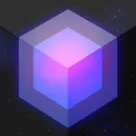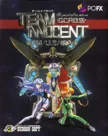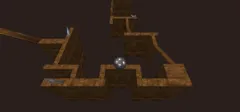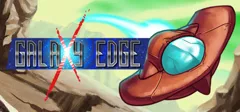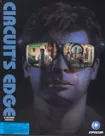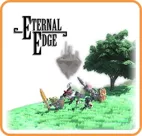Planet's Edge: The Point of no Return
Description official descriptions
The discovery of an alien craft entering our solar system causes quite a stir. When the small craft is accidentally fired upon, it creates a strange electromagnetic effect that envelops the Earth, causing it to disappear. While its gravity remains, the physical Earth simply isn't there. The moonbase, surviving on scrounged resources and manpower, builds an interstellar ship. A team of four specialists is then sent into deep space to find unique parts for the construction of the Centauri Drive, a machine that the moonbase scientists hope will cause a reverse effect.
Planet's Edge is a sci-fi role-playing game with space exploration and other gameplay elements, including spaceship combat, mining for resources, trading, and light puzzle-solving. The game begins on the moonbase, where the player can access the shipyard, crew quarters, warehouse, and research lab. The player is put in control of four pre-made characters: William Dean (pilot), Katya Mershova (weapons officer), Nelson Ngatadatu (engineer), and Osai Tsakafuchi (medic) . Each of these characters can be cloned for different attribute rolls, while retaining their primary skills: astrogation and ship weapons for William; light, heavy, and hand weapons for Katya; ship repair and computers for Nelson; and first aid and xenobiology for Osai. Unlike most role-playing games, characters do not receive experience points and can only become stronger by equipping better weapons and armor.
The game is completely open-ended, allowing the player to travel to any of the dozens of stars. The player physically navigates the ship on an overhead screen. Entering a star system enlarges the view, allowing the ship to orbit a planet. Though most planets cannot be landed on, a large amount remains that can be explored on foot from a top-down view similar to that of Ultima VI. Each planet is represented by an enclosed populated area, usually containing friendly NPCs as well as enemies. Advancing the storyline involves gathering clues from various characters as well as obtaining objects, many of which have to be used in other locations in a puzzle-like fashion. Combat on the ground is turn-based and can be avoided in most cases.
Planets can also be mined for various elements such as organics, metals, liquids, etc. These elements can be then brought back to the moonbase, where they can be used to produce better equipment for the crew members or upgrade the spaceship. Alien technological blueprints can also be recovered and used in the research laboratory to develop new ship models. The spaceship can carry cargo between planets, which can be traded or used to bribe hostile aliens. If the bribe is unsuccessful or the player decides not to resort to it, a fight against a hostile ship ensues. These fights are action-based, requiring the player to manoeuvre the ship in real time while shooting at the opponent.
Spellings
- プラネッツ・エッジ - Japanese spelling
Groups +
Screenshots
Promos
Videos
Add Trailer or Gameplay Video +1 point
See any errors or missing info for this game?
You can submit a correction, contribute trivia, add to a game group, add a related site or alternate title.
Credits (DOS version)
37 People (35 developers, 2 thanks) · View all
| Directed By | |
| Designed By | |
| Programming | |
| Sound | |
| Computer Graphics | |
| Manual |
|
| Production |
|
| Playtesters | |
| Goober Buddy | |
| Technical & Creative Writing | |
| [ full credits ] | |
Reviews
Critics
Average score: 78% (based on 5 ratings)
Players
Average score: 4.2 out of 5 (based on 15 ratings with 2 reviews)
A richly imaginative space RPG!
The Good
The developer most known for their famous role-playing series came up, during a very creative period of game-making, with an unusual game that combined traditional RPG with space exploration, ship combat, and resource-collecting in the vein of Starflight.
Unlike that game, Planet's Edge has much stronger old-fashioned role-playing elements, which makes it an even richer and more varied experience. The "meat" of the game are planet exploration sequences, where you visit large, complex areas, fight enemies, talk to NPCs, and gather items and information.
The beautiful thing about this game is its completely open-ended nature. Most of the planets cannot be landed on, but that's not saying much, because the game's world is absolutely huge, and you probably won't be complaining about the quantity of explorable locations. There are eight or so space sectors, each with a dozen star systems. Of all those, there are probably about thirty planets you can beam down to and explore. Most of them have crucial importance to the complex, overarching main quest line, which involves meticulous collecting of vital information and objects. However, the player is free to go anywhere right from the beginning and tackle any planet or even attempt to solve any scenario.
This means that Planet's Edge gives the player a feeling I particularly value when playing RPGs: it doesn't force a certain playing style upon you, it lets you play at your own pace and your own degree of care or recklessness. Fancy getting some of the game's most powerful weapons and armor? Explore faraway systems and see whether you'd stumble upon an area where you can quickly snipe an overly tough enemy and get his goodies. Afraid of the risks? Do things by the book, follow the hints, and stick to well-trodden paths. Feel underpowered, frustrated? Take a break from this whole Earth-restoring thing, fly around, take on easier pirates, mine planets, trade with vendors, outfit your ship. It's your choice that matters.
A recurrent problem with open-ended RPGs is a certain "copy-paste" quality of their quests. Not so in Planet's Edge. Among other objectives, you'll rescue an avian princess from an unwanted marriage, prevent an assassination of an interstellar politician (or perform this assassination by yourself!), study the peculiarities of an alien race that has no concept of property, investigate murders, visit a zoo and an underground palace, and more. What's particularly refreshing is the clever structure of the quests. While there are some "beam down on the planet and kill everything" sequences, most quests actually offer free exploration of large and complex locations, and are completed by careful investigation, dialogue, and even puzzle-solving. This grants the game a delightful adventure-like flavor.
Another borrowing from adventure games - which I absolutely loved - is attention to detail and text feedback. Not only are there well-written, informative, unique conversations with dozens upon dozens of NPCs - the "look" and "examine" command can be used pretty much on anything, and more often then not the game will comment on that. Of course, there are quite a few generic "you see a wall" statements, but you can take a look at the screenshots for examples of some detailed, elaborate, and lovingly written text feedback that brings back nostalgic days of traditional adventure.
There are two types of combat in the game: turn-based party combat on planet surfaces (largely unavoidable in hostile areas), and arcade ship battles in space, most of which can be skipped in one of the two ways - bribing the opponent (not recommended), and simply flying your ship at top speed, outmaneuvering the enemies. Space combat seems chaotic and completely unfair at first, so it's best avoided for a long stretch of the game; however, once you've built stronger ships, it becomes much less of an issue. There seems to be a bug in my version of the game that limits your practical arsenal to missiles, but I was able to complete a crucial attack on a heavily guarded planet with a very good ship equipped solely with that type of weapon. Once you get the hang of it, ship combat becomes quite entertaining.
As for the turn-based ground battles, they are what you'd expect from a full-fledged RPG - with the cool addition of firearms. The battles are tactical and very satisfying - weapon strength and accuracy, armor ratings, distance, angle, skill levels of the characters - everything is taken into account. Although your four characters cannot level up, they can be cloned with different skill sets at any time. Weapons and armor play a huge role - there are vast amounts of light and heavy firearms as well as various armor suits to find in the game, and the hunt for better equipment can become one of the most fulfilling aspects of the game. It's refreshing to miserably die from one rifle shot of a mean-looking greenish alien, only to come back with a grenade launcher and show him and his friends what humans are capable of.
The Bad
This ambitious space exploration role-playing game was surely ahead of its time, and it's rather obvious how it struggles against technical limitations and gets dragged into some nasty balance issues. While hardcore role-players might frown upon the game's lack of attribute progression for the characters, its open-ended nature coupled with precise plot progression requirements may lead to dead ends, so better have a clue book at hand.
For an inexplicable reason, my version of the game did not allow me to use any weapons in ship combat except missiles, which exacerbates the already high difficulty. Outfitting a really strong ship with several missile rows eventually does the trick, but if things look too grim, I wholeheartedly recommend mild cheating.
In fact, the player is quite tempted to cheat in this game due to the excruciating speed of resource-collecting. I might have missed some nifty shortcuts or whatnot, but building new ships (which you will need) is a painfully slow process, because resources are so rare. Prepare to spend most of your game cruising around, mining everything at sight, waiting for the resources to respawn, and so on. It's like Star Control II, only more so. And, while you are at it, be ready for irritating encounters with pesky pirates, whom you have no chance to defeat in your puny starting ship. It's a great thing you can save absolutely anywhere and, with some skill, outmaneuver most of those criminals.
The Bottom Line
Planet's Edge requires a lot of patience and will annoy you with its quirks; but give it a chance and you'll be captivated by its wonderful universe and rich gameplay. This is an underrated classic if I've ever seen one.
DOS · by Unicorn Lynx (181577) · 2017
Fantastic turn based role-playing/real time space combat adventure.
The Good
Planet's Edge features a fantastic puzzle-based RPG storyline. Although most puzzles are of the "find this object, talk to this person" form, there are quite a few surprises. Many puzzles are optional or have multiple solutions. The RPG-style stats are minimalist and avoid cluttering or complicating the game. The equipment, weapons and armour are interesting, as is the sheer range of different planets and situations encountered through the game. The ability to customise your own ship is understated but fun nonetheless.
This was the first game I ever heard through my brand-new Sound Blaster card, and to this day I love the very atmospheric music. Sound effects were adequate, and for its time the graphics were quite lush.
The Bad
For a hardcore RPG fan, the minimalist stats leaves much to be desired, as does the lack of any way to actually increase a character's stats (other than replacing them with a clone.) There are a few bugs to be found in the game, some obstructive and annoying, and one or two rather more serious ones. Although it is fun to customise your ship, I didn't enjoy the real-time space combat segment, and feel the game would still stand out without this part. Furthermore I dislike the fact that occasionally it was impossible to avoid combat with a faster, stronger enemy you could not yet defeat.
Although the ground combat is my favourite component of the game, it leaves much to be desired. It is very basic - tactics or strategy don't play a role.
The Bottom Line
Although it can be difficult to run on modern computers due to speed up (DosBox helps), Planet's Edge is worth the effort. The storyline alone is epic and interesting, as you unravel what seems to be a galactic conspiracy. If you are a hard-core stat-pumping RPG fan, the game may disappoint due to its emphasis on puzzle solving rather than RPG stats, and adventure gamers may appreciate the story but tire of the mainly simplistic puzzles. However as a work of art Planet's Edge shows an attention to detail, in depth story line, atmospheric music and, for its time, fantastic graphical artwork.
DOS · by Shane Cornall (6) · 2006
Analytics
Identifiers +
Contribute
Are you familiar with this game? Help document and preserve this entry in video game history! If your contribution is approved, you will earn points and be credited as a contributor.
Contributors to this Entry
Game added by George Shannon.
Macintosh, Windows added by Rik Hideto. FM Towns added by Sciere. PC-98 added by Terok Nor.
Additional contributors: Plok, Skippy_Chipskunk.
Game added January 21, 2000. Last modified October 4, 2024.


